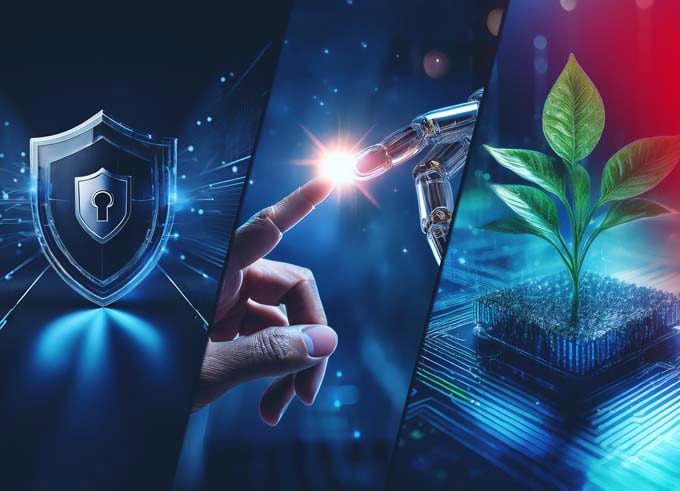Trends in automation: safety, AI and sustainability are future drivers
Economic uncertainties, growing regulatory pressure and a shortage of skilled workers are slowing down the industry's ability to compete and innovate. Automation is a powerful lever to counter these challenges. Bosch Rexroth sees four key trends that will shape automation in 2025: Increased safety measures, artificial intelligence, more sustainability and open ecosystems.

"Automation is and remains the key to making industry future-proof and competitive. It enables efficiency gains, new business models and more added value. We are noticing that more and more companies are turning to automation platforms with ecosystems, as these offer the greatest possible scope for action. This trend will continue to intensify in 2025," explains Steffen Winkler, Sales Manager of the Automation & Electrification Solutions business unit at Bosch Rexroth.
Even stronger focus on security with Cyber Resilience Act
With the Cyber Resilience Act (CRA) coming into force at the end of 2024, manufacturers and operators of industrial automation systems are facing new security requirements. The European regulation aims to improve security standards for digital products and thus strengthen their resilience to cyber attacks. Products should be securely designed and updatable throughout their entire life cycle.
"IT security is more essential than ever for successful digitalization strategies and products. The CRA provides clear guidelines here - an important step towards creating a high level of security across the board and strengthening users' trust in digital solutions. It is therefore important to make automation solutions fit for these challenges, just as we have already done with our ctrlX OS operating system. It is designed to be secure from the ground up and is therefore ideally prepared for the requirements of the CRA," says Winkler.
For companies in the automation industry, the CRA means an even greater focus on safety and product integrity. Compliance with the new guidelines requires a rethink that starts at the product development stage.
AI is a driver of innovation in automation
Artificial intelligence will continue to grow in importance in 2025 - including in the automation sector. More and more AI-supported applications are being incorporated into automation systems. AI-based apps are also already available in the partner world ctrlX World.
Artificial intelligence is increasingly being embedded in software. AI-supported software modules, such as neural networks for image processing solutions, are changing automation possibilities. In practice, AI is also providing new operational insights by analyzing data streams in automation devices. And it is changing the way we work, for example in software development. Tools such as Coding Co-Pilots accelerate programming and help to write code faster.
This enables significant efficiency gains both in the development of automation technologies and in their application.
Sustainability as a strategic goal
Sustainability and energy efficiency will continue to drive the industry and therefore also the automation sector. Industry plays a crucial role in achieving global climate targets. Sustainable production requires zero emissions, resource efficiency and cost-effectiveness.
This is why, for example, more and more energy-saving functions are being incorporated into automation components. Energy and performance simulation tools are also making an important contribution to optimizing the energy efficiency of production processes. There is further potential in the professional remanufacturing of automation components: Remanufacturing reduces the CO2 footprint of used components by more than 50 % compared to new products and conserves valuable resources.
Open ecosystems for collaborative innovations
"The automation industry in Germany is an international leader. In order to secure and expand this leading position, it is crucial to further strengthen Germany as a business location and promote the industry's competitiveness," explains Winkler, adding: "Being a technological leader alone is no longer enough to remain successful in global competition in the long term."
The key lies in open platforms and collaborative ecosystems that create real benefits for users. Such ecosystems combine the strengths of different players and thus enable the development of new, innovative approaches. This creates a culture of collaboration in which partners from different areas work together on solutions that go far beyond the capabilities of individual companies. Open cooperation also strengthens users' confidence in digital technologies, as they receive more flexible, interoperable and future-proof solutions.
Bosch Rexroth is constantly driving forward openness and co-creation in the world of automation with its ctrlX OS operating system and the ctrlX AU-TOMATION automation system.









